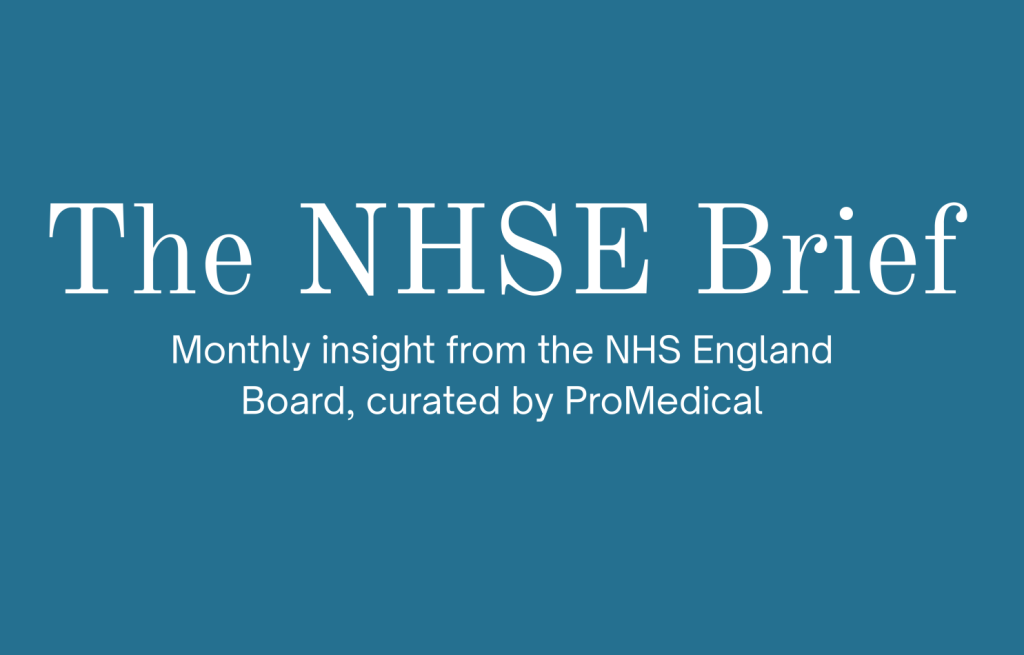The NHSE Brief: June 2025 Edition
1 Jul 2025 |
| Share with

Your monthly insight into NHS England’s direction of travel, curated by ProMedical
From the CEO
At a time when NHS priorities are evolving rapidly, it’s more important than ever to listen, align, and respond thoughtfully. The NHSE Brief is our monthly commitment to understanding the system’s direction and sharing it with those we serve, with humility, clarity, and care.
— Altin Biba MBA, AMBA, CEO, ProMedical
Context: May Board Meeting & Performance Reports
This month’s NHSE reports paint a clear picture: despite progress across elective care and cancer performance, pressures on urgent care, mental health, maternity, and productivity remain deep-rooted. System leaders are doubling down on delivery discipline, digital adoption, and workforce reform, while preparing for the upcoming 10-Year Health Plan to reset long-term strategy.
At ProMedical, we’ve distilled the material into five key themes to help our clients and the wider healthcare professionals community understand what’s changing, and where system-wide focus is heading.
System Performance Snapshot
- Elective Care: The waiting list stands at 7.42 million, but 65+ week waiters have reduced by 84.9% over the last year. NHSE is now focused on achieving 18-week RTT performance (target: 65% by March 2026), and improving first appointment access (target: 72%).
- Cancer: Faster Diagnosis Standard at 78.9%, with ambition to push to 80% by 2026. 62-day standard stands at 71.4% (vs 85% constitutional target).
- Urgent & Emergency Care: Pressures easing slightly, but 12-hour breaches and corridor care still prevalent. Ambulance handover delays remain a challenge, with 213,769 hours lost in April alone.
- Diagnostics: Despite record testing volumes, total diagnostic waiting list hits 1.7 million. 18.4% still wait over 6 weeks, far above the 1% constitutional standard.
System Implication: There is now little tolerance for reactive approaches. Boards are expected to demonstrate progress through segmented performance, data-informed resource planning, and consistent operational discipline.
Workforce, Finance & Delivery Discipline
- ICSs are forecasted to end the year with a combined deficit of £600m, a notable recovery from last year’s £1.5bn.
- NHS England will meet its financial mandate, supported by a lower overall pay bill.
- NHSE has set an expectation of at least 30% reduction in agency costs across systems in 2025/26.
- Emphasis is being placed on leadership development, productivity tools, and quality improvement.
System Implication: Efficiency is no longer a background task, it is a leadership priority. Trusts are expected to rebalance temporary staffing bank and agency, invest in delivery support, and make productivity gains visible.
Digital, Data & Interoperability
- Just 11% of NHS staff report access to basic digital tools.
- 70% cite poor interoperability as a barrier.
- NHS England aims to reduce reliance on letters by scaling NHS App usage, targeting 36m fewer letters annually.
- The single patient record programme is gathering momentum, centred on interoperability, ownership, and shared standards.
System Implication: Digital maturity remains uneven, but the direction is clear. Systems are expected to invest in tools that enable flow, reduce manual processes, and support care integration across settings.
Maternity Outcomes, Equity & Safety
- Maternal and neonatal safety remain a national focus, following the Ockenden review and ongoing variation in outcomes.
- NHSE is placing emphasis on equity of access, improved perinatal surveillance, and workforce skill mix.
- The Board highlighted digital toolkits and better use of data as critical enablers of improvement.
System Implication: Trusts and ICSs are being asked to deliver visible improvement in maternity experience and safety. Leadership, culture, and pathway redesign are central to this shift.
Community, CYP & Mental Health
- Children’s community waiting lists up 114% year-on-year.
- Mental health length of stay remains high (58.4 days) and out-of-area placements persist.
- NHS Talking Therapies recovery rate above target (48.5%), but total completions still below target.
- Dementia diagnosis stands at 65.6% (target: 66.7%).
System Implication: System leaders are prioritising community-based capacity, earlier intervention, and integrated mental health pathways to manage demand and prevent avoidable deterioration.
Final Word
The May reports show an NHS determined to improve, but under no illusion about the scale of its challenge. Rising complexity in patient needs, persistent financial constraint, and wider geopolitical pressures continue to stretch the system in unprecedented ways.
Through it all, healthcare professionals continue to show extraordinary commitment, and NHS leaders are working at pace to deliver change under intense pressure. Both deserve recognition.
What matters now is system-wide alignment, clarity of purpose, and unwavering focus on delivery.
At ProMedical, we remain closely aligned to the NHS’s strategic direction. We believe in contributing where it counts, by supporting the healthcare workforce, strengthening care pathways, and helping deliver practical solutions that protect what matters most: care quality to patients, access, and long-term resilience.
As insight providers, we also recognise a responsibility to surface blind spots and highlight pressure points, not to criticise, but to help move the system forward, together.
If any of the themes in this month’s Brief resonate, we’d welcome a quiet, considered conversation.
Leave a Comment
You must be logged in to post a comment.

01 Jul 2025 | Leave a comment
Share with socials